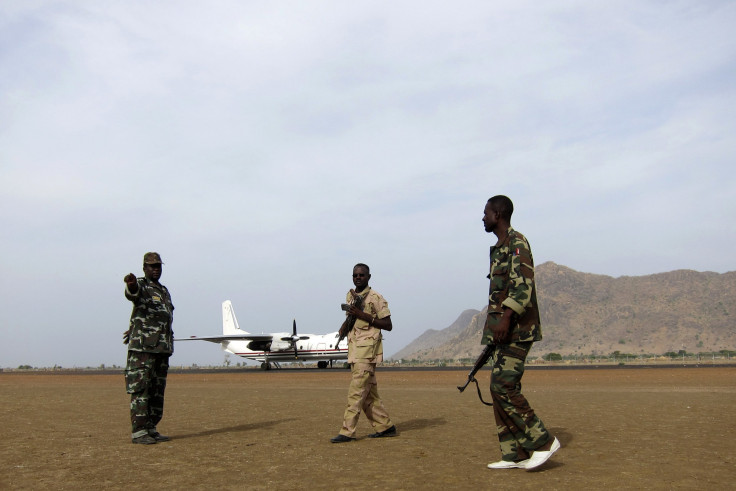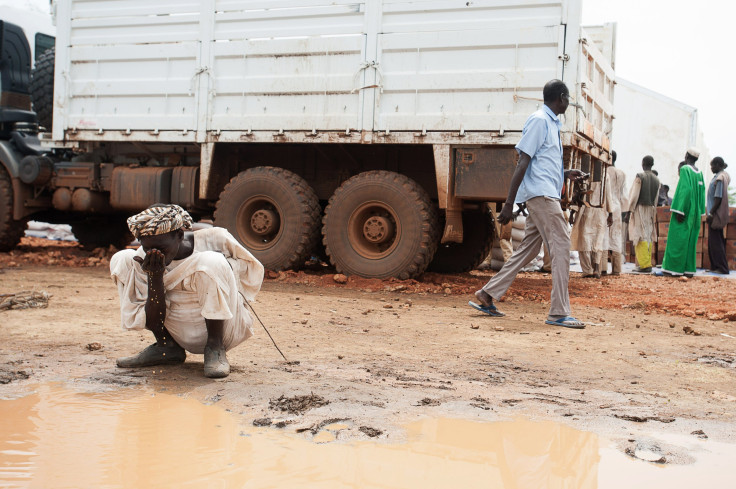China-Sudan Financial, Military Relations At Risk Amid Beijing's Economic Woes

For decades, China has provided Sudan with billions of dollars in financial, diplomatic and military support in exchange for the African country’s vast oil reserves. But as war-torn Sudan sinks deeper into financial and civil crisis, Khartoum soon might not have Beijing to fall back on.
Fears over a Chinese economic slowdown escalated this week after the Shanghai Composite index logged its sharpest single-day drop in eight years Monday. China’s market slump pounded commodity-linked currencies in Africa, including the Sudanese Pound, which is at an all-time low. For Sudan, that could mean less cash and arms from Beijing, which could exacerbate the country's food insecurity, fragile economy and civil unrest, experts said.
“You have a Sudanese economy that is relentlessly being run into the ground. It can’t survive,” said Eric Reeves, a Sudan researcher and analyst at Smith College in Massachusetts. “The Sudanese economy is crumbling with or without Chinese support.”
Sudanese government forces and allied militias have fought a raging rebellion in Sudan’s western Darfur region since 2003, after rebels took up arms and accused President Omar al-Bashir's regime for neglecting the region. In the oil-rich South Kordofan and Blue Nile regions, Bashir’s government is also battling an active insurgency by the Sudan People’s Liberation Movement-North, a pro-South Sudan militant group. At the same time, government forces have been accused of targeting civilians with killings, rape and abuse. More than 2.3 million people have been displaced throughout the country and 6.9 million people are in need of humanitarian assistance, according to U.N. figures.
Bashir, who is wanted for alleged war crimes and genocide, extended his 25-year rule in April and has made no concerted effort to peacefully end the major armed conflicts and political instability roiling the country, experts said. The rebel groups seek to change the policies of Sudan's Islamic-run government to satisfy the needs of its people regardless of race, religion or gender.

Sudan lacks the necessary resources and infrastructure to build its own sophisticated artillery. So Bashir’s regime has long relied on China for a majority of its weaponry, including countless rocket launchers, tanks, aircrafts and missiles.
After decades of Chinese weapon transfers, Sudanese forces will be well-armed in battles for years to come. But Bashir could ultimately struggle to arm his forces against rebellions if Beijing cuts back on financial and military support to cope with its own economic issues, experts said.
“This is not a diplomatic decision or a military decision. It’s the fact that you’ve got a truly collapsing economy in Sudan and an economy that’s in serious turmoil in China,” Reeves said. “[Beijing] can’t be signing this billion dollar deal and that billion dollar deal. Those millions of dollars are needed at home for a lot of reasons.”
Rich in energy and mineral resources, Africa is China’s largest investment destination. Chinese Premier Li Keqiang announced last year that China expects to reach $400 billion in trade volumes with the continent and raise its direct investment to $100 billion by 2020. As China’s third-largest trading partner in Africa, Sudan is high on the list. China has invested more than $10 billion in Sudan in the past two decades, providing low-interest loans and weapons transfers in return for oil.
Although Chinese investment has helped develop Sudan’s oil industry, the country lost about three quarters of its oil reserves when South Sudan seceded in 2011 after two decades of civil war. Most of Sudan’s oil is located along the restive border with South Sudan and the two countries both lay claim to oil-rich Abyei region, which is near conflict-torn South Kordofan. The armed conflicts in Darfur, Blue Nile and South Kordofan regions have also stymied oil production and economic growth.

Sudan also has profound debt and Bashir’s government has failed to invest in public infrastructure such as agriculture and safe water. With its deep and wide-reaching swaths of poverty, Sudan must import one million tons of wheat each year just to feed its population. As markets worldwide react to China’s economic slowdown and commodity prices collapse, imported goods will become more expensive, meaning Sudan will further struggle to meet the basic needs of its people.
“Bashir, I think, doesn’t have China in his pocket quite to the same extent as he did previously,” said John Campbell, the Ralph Bunche senior fellow for Africa policy studies at the Council on Foreign Relations, a non-profit think tank in New York City.
A deepening financial situation in Sudan coupled with ongoing civil unrest could trigger further rebellion in the country, if the Sudanese government lacks cash and arms necessary to assert its power, experts said.
"If you can't provide your people with food and water, they're going to get thirsty and hungry, and then angry," Reeves said. "It's not that far in the future."
© Copyright IBTimes 2024. All rights reserved.





















